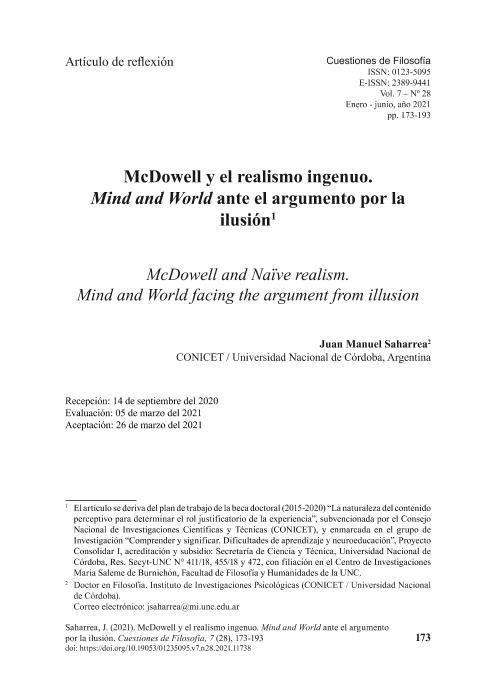Artículo
Mediante el análisis conceptual el artículo reconstruye algunos aspectos de Mind and World de John McDowell, orientados a ampliar el rol explicativo de la tesis de la “carencia de límites de lo conceptual”. Para esto se vincula dicha tesis, que corre el riesgo de ser objeto de la objeción de idealismo en sus variantes “más perniciosas”, con la idea de percepción como “apertura al mundo”, que niega decididamente un idealismo semejante. Si bien la defensa del rol justificatorio del contenido perceptivo da cuenta de esta última tesis, no muestra, al menos explícitamente, relaciones posibles con la primera. Este artículo, en cambio, propone resolver esta tensión. Así reconstruye la posible respuesta del conceptualismo de McDowell al argumento por la ilusión. De este modo, a partir de la distinción entre posibilidad ordinaria de error perceptual y posibilidad en principio de error perceptual –derivada del tratamiento de McDowell sobre la incorregibilidad perceptual– se concluye que la “carencia de límites de lo conceptual” y la afirmación de que ordinariamente la percepción nos proporciona conocimiento directo de hechos del mundo, no son incompatibles desde la perspectiva de la posibilidad ordinaria. This article rebuilds, through conceptual analysis, some of the aspects in Mind and World of John McDowell aimed at broadening the explanatory role of “the unboundedness of the conceptual” thesis. In order to achieve this, the aforesaid thesis –which runs the risk of being object of the idealism’s objection in its “most pernicious” variants has been connected with the idea of perception as “openness to the world”– which decidedly denies a similar idealism. Although the defense of the perceptual content’s justifying role acknowledges this last thesis, it does not show possible connections with the first one (at least, not in an explicit way). This article, on the contrary, aims at easing this tension, thereby rebuilding McDowell conceptualism’s answer to the argument from illusion. Thus, the conclusion drawn from the distinction between the ordinary possibility of the perceptual error and possibility in principle (of perceptual error) –derived from McDowell’s treatment of perceptual incorrigibility– is that “the unboundedness of the conceptual” and the assertion that perception provides us with direct knowledge of the world’s facts are not incompatible under the perspective of the ordinary possibility.
McDowell y el realismo ingenuo: Mind and World ante el argumento por la ilusión
Título:
McDowell and Naïve realism: Mind and World facing the argument from illusion
Fecha de publicación:
29/04/2021
Editorial:
Universidad Pedagógica y Tecnológica de Colombia
Revista:
Cuestiones de Filosofía
ISSN:
0123-5095
e-ISSN:
2389-9441
Idioma:
Español
Tipo de recurso:
Artículo publicado
Clasificación temática:
Resumen
Palabras clave:
MCDOWELL
,
REALISMO
,
MENTE
,
MUNDO
Archivos asociados
Licencia
Identificadores
Colecciones
Articulos (IIPSI)
Articulos de INSTITUTO DE INVESTIGACIONES PSICOLOGICAS
Articulos de INSTITUTO DE INVESTIGACIONES PSICOLOGICAS
Citación
Saharrea, Juan Manuel; McDowell y el realismo ingenuo: Mind and World ante el argumento por la ilusión; Universidad Pedagógica y Tecnológica de Colombia; Cuestiones de Filosofía; 7; 28; 29-4-2021; 173-193
Compartir
Altmétricas




